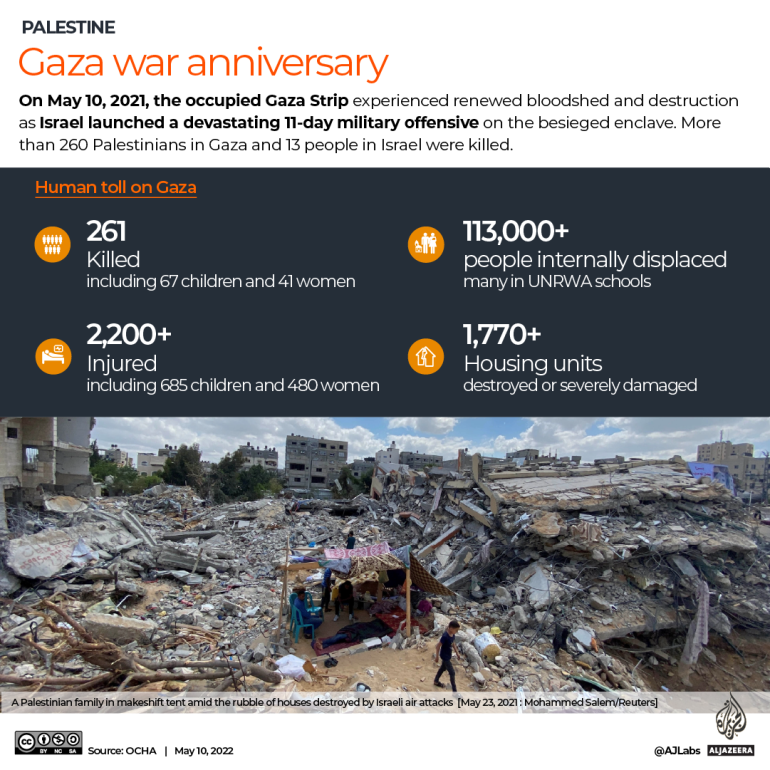
Gaza City – It has been a year since Buthaina al-Qamo’ lost her husband, Hazem.
The 49-year-old was killed on May 16, 2021, during Israel’s offensive on the Gaza Strip, when the residential building the al-Qamo’ family of seven lived in on al-Wehda Street in central Gaza City was bombed.
The building, along with the one next to it, collapsed on the families living inside in the middle of the night, and with the surrounding streets also destroyed, ambulances found it difficult to arrive on the scene.
At least 45 Palestinians were killed in the air attacks, including 18 children, which sparked widespread international condemnation.
“Although a year has passed since that day, my two sons and I – who were in the house – have not overcome that night when our house was bombed without warning,” Buthaina told Al Jazeera.
“We were sitting together watching TV and talking to my sister from Jordan via a video call. Hazem and my two sons, Mohammad and Khaled, were trying to locate the bombardments, which were very loud,” she said.
A few minutes later, the bombing intensified, Buthaina said. Then, a single strike, and everything collapsed.
Buthaina tells her story with tears in her eyes, as she recounts the hours she spent under the rubble, unaware of her husband’s fate.
“The last thing I saw was my children’s room. I called them and they answered, but I wanted my husband Hazem to come and help me.”
“I didn’t know that he had been killed.”
In May 2021, the besieged Gaza Strip experienced renewed bloodshed and destruction as Israel launched a devastating 11-day military offensive on the enclave.
It was the fourth major offensive launched by Israel on the Palestinian territory in 14 years, compounding the already dire living conditions and the high rates of poverty and unemployment in Gaza, which has been under an Israeli-Egyptian blockade since 2007.
The assault in May killed 261 people, including 67 children, and wounded more than 2,200, according to the United Nations. The bombardment also destroyed 1,770 residential units and partially demolished at least 14,300 other units, according to Gaza’s health ministry.
Rockets fired from Gaza also killed 13 people in Israel. Tel Aviv says that the offensive was a justified response to rockets and other projectiles fired from the Gaza Strip, and puts the blame on the territory’s rulers, Hamas.
Buthaina and her family have to live with the consequences of the offensive every day.
“Life is not the same without my father. He was very funny, very kind. We miss him very much,” said Mohammed, who sat silently next to his mother.
The family had to move between apartments until Buthaina was able to use her husband’s savings to buy an apartment. But even that was a difficult decision.
“At any moment you might lose your home in a few seconds and become homeless,” Buthaina said. “I chose the furniture and colours of the house according to what my husband and I were planning, even the sofa set was his choice before his death. He always dreamed of owning an apartment, but we did not expect to live in it without him.”
A year on, with violence in Israel and the occupied West Bank once again increasing, Buthaina is fearful of yet another war in Gaza.
“We watched what happened in Al-Aqsa in the holy month of Ramadan, the same scenes before last year’s war were repeated again,” Buthaina said. “The escalating events always bring us back to the memories of war that we have not yet recovered from.”
“We, the people of the Gaza Strip, get used to all these pains, but no one speaks for us.”

‘Pillar of the house’
The Soboh household is still mourning two losses: 57-year-old Amira, and her 19-year-old son, Abdelrahman, who suffered from cerebral palsy.
They were killed in Israeli air attacks at their apartment building in the Shati refugee camp on May 11, 2021, on the second day of the Israeli offensive.
“We did not think it would be a large-scale offensive. We thought it was a short escalation,” Amira’s son, Muath, told Al Jazeera.
“At that night, we broke our fast together, prayed, and ate qatayef sweets. Everything was normal,” he added.
But, when the family woke up for their pre-fast meal, their apartment was suddenly hit by a bomb. At the time of the bombing, Amira was holding her disabled son, and they died together, Muath explained.
The losses were not the Soboh family’s first – Muath’s father was killed in an Israeli bombing in 2003. After that, Amira took charge of the family, raising her children – a daughter and six sons – on her own.
Reflecting on the last year, Muath expressed his grief.
“My mother was the pillar of the house, she cooked the most delicious dishes, she gathered us together, especially in Ramadan and Eid,” Muath said.
“Today our house is destroyed, we live in a rented house and there is no prospect for reconstruction,” Muath said. “We all miss the warmth of the family, we feel as if our lives were stolen from us and they’re never coming back.”
Instead of talking of reconstruction, Muath sees the prospects of war on the horizon, once again.
“It is as if this part of the earth is destined to suffer and sacrifice,” Muath said. “Personally, I lost everything I possessed and I no longer expect anything or grieve for the loss of anything.”
“I lost the most precious people in my life, my mother and brother, and our home. There is nothing to grieve for, just like all the families in the Gaza Strip.”







